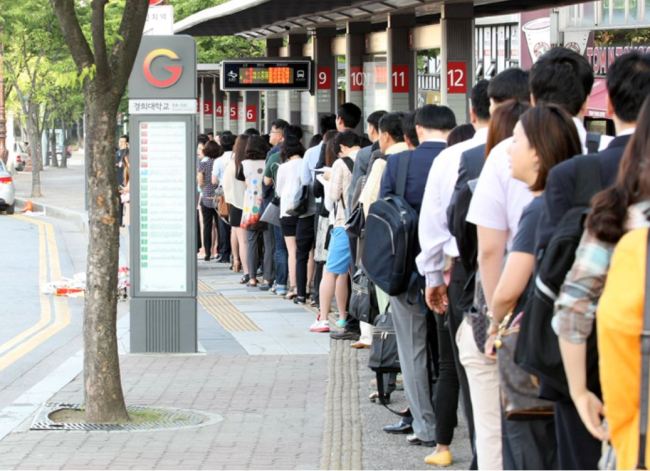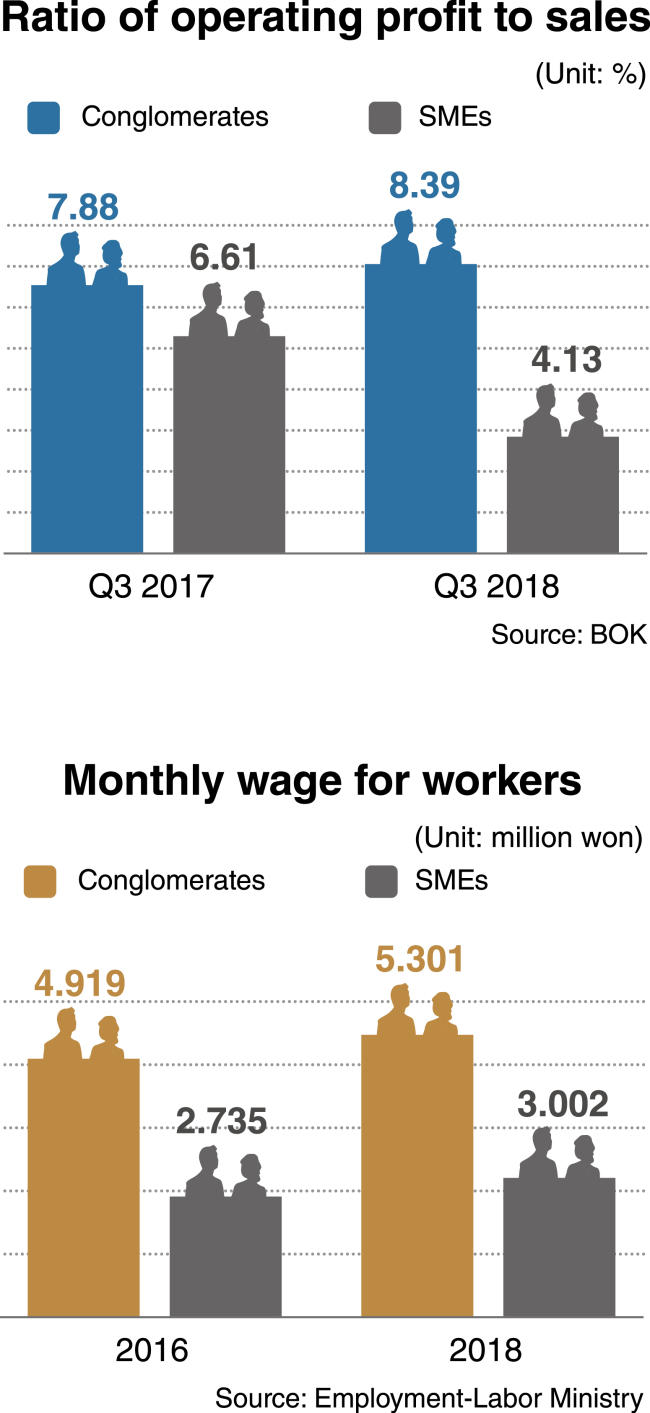[News Focus] Widening economic gulf presents another headache for Moon in 2019
By Kim Yon-sePublished : Dec. 31, 2018 - 16:05
SEJONG -- As the new year approaches, so does the middle phase of President Moon Jae-in’s 60-month tenure.
The coming 20 months could be a time for Moon to respond to the concerns of citizens, the majority of whom are asking him to walk back his North Korea-oriented policy focus and prioritize the economy in the South.
Statistics indicate that one of the biggest concerns of ordinary people is the increasing polarization of society -- a problem aggravated by the recent jump in apartment prices in Seoul.
In the business world, polarization has worsened both in terms of company earnings and payments to employees.
The coming 20 months could be a time for Moon to respond to the concerns of citizens, the majority of whom are asking him to walk back his North Korea-oriented policy focus and prioritize the economy in the South.
Statistics indicate that one of the biggest concerns of ordinary people is the increasing polarization of society -- a problem aggravated by the recent jump in apartment prices in Seoul.
In the business world, polarization has worsened both in terms of company earnings and payments to employees.

Collectively, conglomerate business units saw the ratio of operating profits to sales reach 8.39 percent in the third quarter of 2018 -- an on-year increase of 0.51 percentage point, according to the Bank of Korea. That is its highest level since financial authorities began measuring it.
In contrast, the operating profit-to-sales ratios of small- and midsized enterprises stood at 4.13 percent, down 2.48 percentage points from a year earlier, marking an all-time low. As a result, the profitability gap between large firms and SMEs has widened to a record high.
A research fellow from the LG Economic Research Institute attributed the disparity to business difficulties in the heavy industries.
“Sectors such as automobiles and shipbuilding (previously) contributed greatly to sales of subcontractors and employment at SMEs,” the researcher said. “But the current situation is lackluster.”
A stock analyst in Yeouido, Seoul, who specializes in the manufacturing sector, said the nation should rethink its reliance on semiconductors for growth. “Compared with the heavy industries, the semiconductor industry does not have much of an effect on subcontractors or SMEs in other sectors,” he said.
He added that the government should strive for greater flexibility in the labor market and map out ways to vitalize SMEs to prevent the trend toward increased business closures among self-employed workers from spreading throughout the SME segment.
According to the Ministry of Employment and Labor, the salary gap between conglomerate units and SMEs is wider than it was two years ago under the administration of former President Park Geun-hye.
During the first 10 months of this year, monthly wages for conglomerate employees averaged 5.3 million won ($4,750), whereas SME employees brought in only 3.0 million won -- a gap of 2.30 million won.
For the same period in 2016, the corresponding figures were 4.9 million won and 2.7 million won, for a gap of 2.18 million won.
That increase of 115,000 won, or 5.2 percent, can be attributed to “sharply increased extra payments from performance-based incentives in segments like semiconductor, petroleum, air carriers, bank and insurance,” said a Labor Ministry official.

Furthermore, the economic slowdown and slack sales have led to more and more SMEs falling behind on debt payments.
Shinhan Bank reported that the overdue loan ratio among SMEs climbed 0.19 percentage point from 0.32 percent at the end of 2017 to 0.51 percent as of November.
At KB Kookmin Bank, the overdue loan ratio among SMEs came to 0.36 percent in November, up 0.14 percentage point from 0.22 percent in late 2017.
Over the same period, Woori and Hana banks saw the figure increase 0.15 percentage point and 0.02 percentage point, respectively.
In online communities, many commentators say SMEs are poised to cut payrolls in the wake of a drastic hike in the statutory minimum wage. “SMEs, like the self-employed, are burdened with the disparity with conglomerates and higher labor costs,” one netizen wrote.
They also say polarization can be seen across all social and economic segments.
“Among those feeling a sense of deprivation are households not owning an apartment in Seoul, men in their 20s amid reverse discrimination from feminism (as they claim), self-employed people and SME workers. ... President Moon should listen to citizens’ requests,” said another netizen, who identified himself as a man in his 40s.
Another office worker said, “Taxpayers’ money should be used for the underprivileged, job seekers, small businesses, homeless people and taxpayers. The year 2019 is Moon’s last chance.”
By Kim Yon-se (kys@heraldcorp.com)








![[KH Explains] How should Korea adjust its trade defenses against Chinese EVs?](http://res.heraldm.com/phpwas/restmb_idxmake.php?idx=644&simg=/content/image/2024/04/15/20240415050562_0.jpg&u=20240415144419)










![[Today’s K-pop] Stray Kids to return soon: report](http://res.heraldm.com/phpwas/restmb_idxmake.php?idx=642&simg=/content/image/2024/04/16/20240416050713_0.jpg&u=)